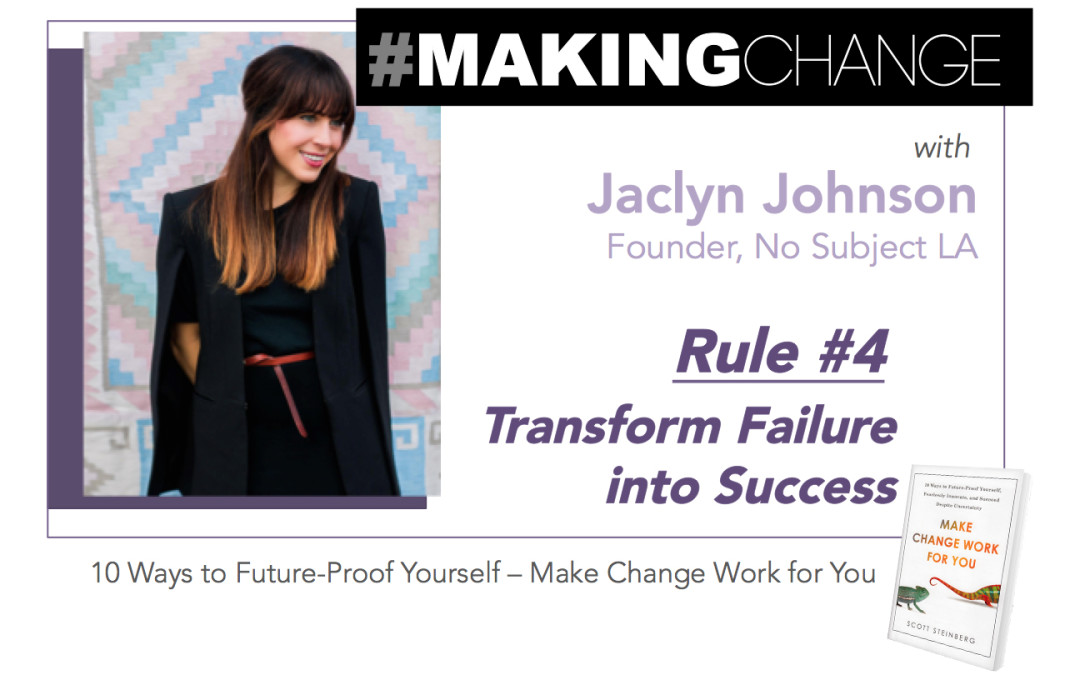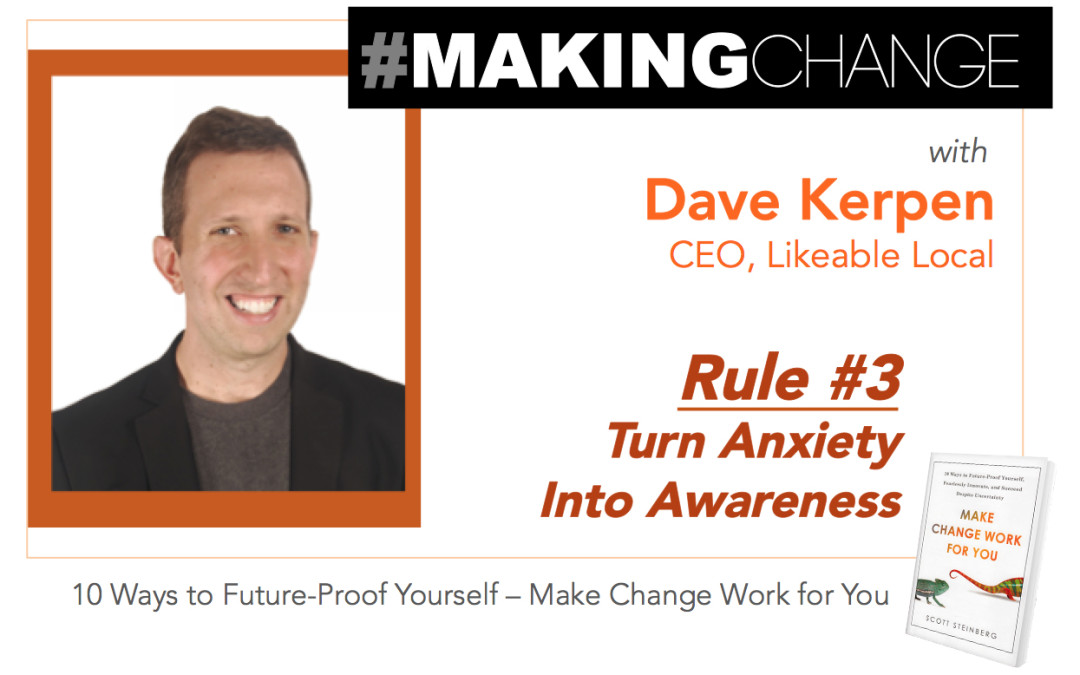![Interview: CALVIN SMITH [Business Innovator]](http://makechangeworkforyou.com/wp-content/uploads/Calvin-Smith-Business-Innovator-1080x675.jpg)
by Annie Jackson | Jan 29, 2015 | General
BUSINESS INNOVATOR Calvin Smith – Principal Manager, Global Innovation, EMC Question: How do you and your organization adapt to fast-changing times and trends? Calvin Smith: Things are constantly changing and evolving today, and nowhere is this more true than in our industry (IT). Moore’s Law was actually created to describe how the best way to adapt is to continuously keep your finger on the pulse of trends. By casting wide nets, both internally (employee ideas across our 66,000 person federation of companies), and externally (academia, startups, our enormous customer/partner ecosystem), we’re able to canvas each environment and build educated predictions of “where things are going,” and then mobilize in advance of trends occurring. Q: What’s one simple change an individual or business can make to achieve success today? CS: I firmly believe in the importance of tapping your company’s greatest resource: it’s employees. Many organizations–both large and small–hire someone to fill a specific role, then ask that individual to take a somewhat myopic approach to their work. We say, “That’s not your job” or “focus on the task at hand” — that’s a very tactical approach to problems. It doesn’t empower the employee to think strategically about the company’s “greater purpose.” If your company is publicly traded, in addition to their “day jobs,” it should be the objective of every employee to increase shareholder value. A company, like anything, is the sum of its parts, and the human capital is the most important “part.” If you have a complex problem to solve, you might be surprised by the kind of responses you would get, if you ask all of your employees for help in solving it. Q: What’s the...

by Annie Jackson | Jan 27, 2015 | General
Finding the courage to embrace change and take chances is the only way to succeed. We’ve asked some of our favorite industry power players and business innovators to share stories of how #MakingChange worked for them, as it relates to the ’10 Rules to Future-Proof yourself, Fearlessly Innovate, and Succeed Despite Uncertainty’. Rule #4: Transform Failure into Success – with Jaclyn Johnson, Founder of No Subject / Create + Cultivate Question: Give us a look into your professional background- how did you get to where you are today? Jaclyn Johnson: I studied magazine production at NYU and interned at Condé Nast throughout college. I took my first job at Time Inc Interactive, at a think tank tasked with strategizing the relationship between print publications and online (this was a while ago). From there, I took a job at an agency called ATTENTION, which at the time, was pioneering some of the first social media marketing and word-of-mouth campaigns. There, I worked with brands like Bluefly, M.A.C. cosmetics, and Hugo Boss, creating buzz-worthy online campaigns focused on social media platforms and influencer engagement. I later joined iCrossing to develop and head up their social media service lines for clients like CVS, Mazda, and Avery Dennison. Following that, I went in-house at Interactive Corporation, where I consulted on their online properties, Pronto and Citysearch. It later brought me to Los Angeles, and I started my own agency, No Subject a little over 5 years ago! Q: What does being courageous in life and business mean to you? What are some of the biggest fears you’ve faced, and how have you overcome them? JJ: Being an entrepreneur requires a lot of courage— mostly against the risk...
![Interview: BRANDON BARNETT [Business Innovator]](http://makechangeworkforyou.com/wp-content/uploads/Brandon-Barnett-Business-Innovator-1080x675.jpg)
by Annie Jackson | Jan 22, 2015 | General
BUSINESS INNOVATOR Brandon Barnett – Director of Business Innovation, Intel Q: As the Director of Business Innovation at Intel, how do you adapt and stay relevant? Brandon Barnett: The first step is understanding complex system dynamics, and how your organization adapts. This goes beyond simply tracking linear trends. As a team, we study social, cultural, economic, and technological forces behind emerging markets. We see markets as an ordered network that emerges from a complex adaptive system, with a large number of components that interact and adapt to each other, that isn’t easy to predict with an isolated understanding of the components. This view means we focus less on trends, and more on transformations–the instabilities and discontinuities in a market. For example, as music has become digitized, the idea of ‘ownership’ has changed. I no longer own my music in the same way I did, because it can now be shared without limits. This isn’t really a trend, it’s a social and economic shift in the music industry that’s transformed our value network and business models. While we might not know what new system will emerge next, we can usually detect signals that the current one will radically change. Q: What’s your advice for getting ahead in an increasingly uncertain world? BB: Embrace uncertainty. Put more accurately, embrace complexity. Companies to expend great effort, time, and treasure, to try to gather data and model scenarios to help mitigate uncertainty. But it only works if the market is quantifiable and competition is known. In today’s internet economy, platforms are established much more quickly than in the past, so it’s a risky strategy to simply watch and wait, and hope to be a ‘fast follower’. The key is to have programs that give real-time feedback about market...

by Annie Jackson | Jan 20, 2015 | General
Finding the courage to embrace change and take chances is the only way to succeed. We’ve asked some of our favorite industry power players and business innovators to share stories of how #MakingChange worked for them, as it relates to the ’10 Rules to Future-Proof yourself, Fearlessly Innovate, and Succeed Despite Uncertainty,’ rolling out one new rule each week. Dave Kerpen, CEO of Likeable Local Question: How did you get where you are today? Dave Kerpen: The story of my first company is pretty unique. We got married and started a company at the same time; we ended up getting our wedding sponsored and paid for—to the tune of $100,000 in sponsorships and $20,000 for charity. It was a great day because I married to the love of my life, but also turned out to be an incredibly successful marketing event for our business. At first, we were worried about getting married in such a public and unorthodox fashion, but we were able to move beyond that fear. I’m very happy we did. Q: On the topic of fear, do you think there’s always a certain amount of discomfort when you attempt something big? DK: Courage is perseverance in the face of fear. Recently, I was teaching a lesson on courage for my daughter’s Girl Scout troop, and I told this story of a girl who witnessed another girl getting picked on, and how she stood up to the bully. I asked everyone to tell me what courage meant to them, and one girl said, “It’s doing the right thing.” Then, my daughter said that the other part is “being afraid in the first place.” I was so proud of her for saying...
![Interview: BRIAN SOLIS [Business Innovator]](http://makechangeworkforyou.com/wp-content/uploads/Brian-Solis-Make-Change.jpg)
by Annie Jackson | Jan 15, 2015 | General
BUSINESS INNOVATOR Brian Solis – Principal at Altimeter Group Question: You’ve been tremendously successful in your career. Would you call yourself an overnight success? Brian Solis: In 1991, I joined an advertising technology firm in Southern California as a database architect. I was building these efficient databases around a paper-based system, which their PR team used to track analysis and publications for media buying. At the time, I was sort of in awe of how little my colleagues knew about technology, and its impact on business. So I went to the president of our agency and asked if I could help add a technology perspective to some of our marketing programs. Shockingly, he said yes. That’s where it all began. While I didn’t go to school for marketing, I knew what technology could do and I was very motivated by the performance metrics used in traditional marketing. Eventually, I was offered an opportunity at a big PR firm in Silicon Valley that was too good to pass up. I didn’t know much about PR, but I offered unique technology perspective and that led to some unconventional success. Q: You said you were programming, were you self-taught? BS: I taught myself when I was a young kid. I was mowing grass to buy my first PC, and I lived through the dot-com rise, where the real opportunity was working with big corporations like HP and Xerox or at startups. Q: How did you survive the dot-com bubble and the subsequent downturn? BS: There wasn’t as much demand during the dark times. You had to be creative. You took your retainers, but you also had to show that you would deliver dividends. There was an emotional element...
![Interview: CALVIN SMITH [Business Innovator]](http://makechangeworkforyou.com/wp-content/uploads/Calvin-Smith-Business-Innovator-1080x675.jpg)
![Interview: CALVIN SMITH [Business Innovator]](http://makechangeworkforyou.com/wp-content/uploads/Calvin-Smith-Business-Innovator-1080x675.jpg)

![Interview: BRANDON BARNETT [Business Innovator]](http://makechangeworkforyou.com/wp-content/uploads/Brandon-Barnett-Business-Innovator-1080x675.jpg)

![Interview: BRIAN SOLIS [Business Innovator]](http://makechangeworkforyou.com/wp-content/uploads/Brian-Solis-Make-Change.jpg)





